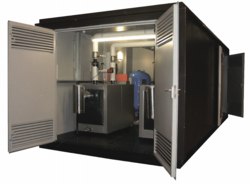Fulton’s term at young offenders’ institution is extended

Although initially installed as a temporary measure at a young offenders’ institution, four prefabricated plant rooms supplied by Fulton Boiler Works are now permanent fixtures.
Four prefabricated plant rooms have been supplied by Fulton Boiler Works to provide heating and hot water for the young-offenders institution at Wetherby. Their installation was initially to provide cover for the early stages of a programme for decommissioning of central boiler plant and decentralisation. Despite being initially supplied as a temporary measure, the plant rooms have proved so reliable and efficient they have been adopted as permanent fixtures. The site is a secure establishment, so it was decided to prefabricate the plant rooms to minimise work on site and disruption during commissioning. Working with the site manager, Fulton developed an engineering specification in a week. Gordon Bareham of Fulton explains, ‘Plant rooms were required at four different locations, each for a different application. The different applications mean that each plant room required two boilers, each meeting a minimum of 60% of full load.’ Each plant room also houses plate heat exchangers for DHW, pressurisation sets and all associated control and safety equipment. Three of them also include integral oil-storage tanks. CAD enabled Fulton to locate all the equipment in the best possible positions to minimise the size of these plant rooms and for interconnecting M&E services.
Related links:


